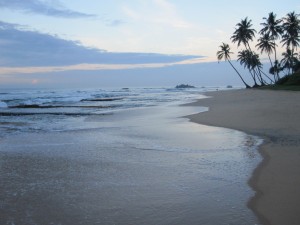The Dutch, The British & The Galle International Literary Festival
I keep being pressed to write about the Galle International Literary Festival at which I was a guest. Some of the requests have been the result of simple interest in my impressions as both native and visitor, others have been somewhat hostile.  I have never been an either with us or against us kind of person; frankly I think that embodying extremism of any sort dilutes and otherwise sullies creative work and I would be hard pressed to identify any writer whom I admire that is guilty of it. It has taken a while for me to reflect on the festival partly because I was in London right after the festival and have only just returned, and partly because my thoughts are complicated by a variety of conflicting sentiments which encompass both my respect for the work that is done to make it possible – and the individuals who do that work – the depth of talent among those attending both as guests and as audience and my sense that everything that we do is a work in progress and therefore could stand to be transformed so long as the transformation is advocated for in a way that leaves intact, whenever possible, the self-worth of the people responsible.
I have never been an either with us or against us kind of person; frankly I think that embodying extremism of any sort dilutes and otherwise sullies creative work and I would be hard pressed to identify any writer whom I admire that is guilty of it. It has taken a while for me to reflect on the festival partly because I was in London right after the festival and have only just returned, and partly because my thoughts are complicated by a variety of conflicting sentiments which encompass both my respect for the work that is done to make it possible – and the individuals who do that work – the depth of talent among those attending both as guests and as audience and my sense that everything that we do is a work in progress and therefore could stand to be transformed so long as the transformation is advocated for in a way that leaves intact, whenever possible, the self-worth of the people responsible.
When my novel appeared in its Dutch translation, my publisher asked me to write a note to accompany its release which referred to our shared history. After ranting in the privacy of my home, I sat down and wrote a note that mentioned the fact that many Dutch public works as well as the tombstones of the old Dutch 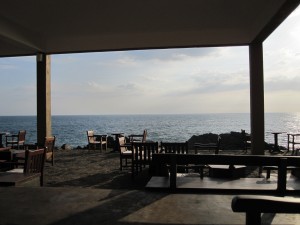 Governors are preserved in Colombo and that the journey of one of the chief protagonists begins in Matara where the Dutch fort, Van Eck, still remains. I tempered my sense of outrage with the request that, at some level, was asking me to celebrate the colonization of Sri Lanka by the Dutch, with my understanding that my modern day publisher may (a) have been unaware of the extent of her country’s involvement in Sri Lanka and (b) was not, herself, responsible for the doings of her compatriots and (c) did not intend to cause me any distress but, rather, was trying to personalize the publication of a book that was being released alongside hundreds of others, and therefore give it a little more heft. That is the nuance that tempers the black and the white.
Governors are preserved in Colombo and that the journey of one of the chief protagonists begins in Matara where the Dutch fort, Van Eck, still remains. I tempered my sense of outrage with the request that, at some level, was asking me to celebrate the colonization of Sri Lanka by the Dutch, with my understanding that my modern day publisher may (a) have been unaware of the extent of her country’s involvement in Sri Lanka and (b) was not, herself, responsible for the doings of her compatriots and (c) did not intend to cause me any distress but, rather, was trying to personalize the publication of a book that was being released alongside hundreds of others, and therefore give it a little more heft. That is the nuance that tempers the black and the white.
At a festival that offered such a range of skill, expertise and intellect, I was disappointed that I was unable to attend several of the conversations 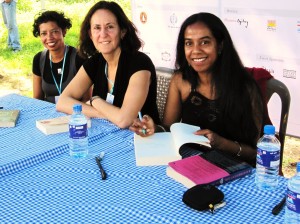 and panels that I would have liked to be at, when the writers featured were excellent and there was much to learn from them. Gillian Slovo, Rana Dasgupta, Amit Varma, Shyam Selvadurai, Michelle de Kretser, Ian Rankin and Sybil Wettasinghe were all people I wanted to spend more time listening to, as they spoke formally, but with whom I did manage to have interesting and fairly lengthy conversations off-scene. Unfortunately, there were many others – Wendy Cope, Iranganie Serasinghe, Artemis Cooper and Michael Frayn among them – whose insights and perspective I missed altogether. My inability to go to all the panels/conversations had little to do with the festival organizers
and panels that I would have liked to be at, when the writers featured were excellent and there was much to learn from them. Gillian Slovo, Rana Dasgupta, Amit Varma, Shyam Selvadurai, Michelle de Kretser, Ian Rankin and Sybil Wettasinghe were all people I wanted to spend more time listening to, as they spoke formally, but with whom I did manage to have interesting and fairly lengthy conversations off-scene. Unfortunately, there were many others – Wendy Cope, Iranganie Serasinghe, Artemis Cooper and Michael Frayn among them – whose insights and perspective I missed altogether. My inability to go to all the panels/conversations had little to do with the festival organizers 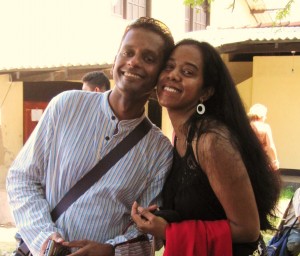 except to the extent that I was also trying to participate in the fringe festival – which showcased, for the most part, the breadth of local talent writing and speaking in English – which then made everything a conscious choice that posed the following question: Am I here for myself? (in which case I must go to all the panels and lectures and conversations taking place on site), or am I here for my fellow Sri Lankans? (in which case I must support them in whatever way I could, but primarily by being attentive to the events that highlighted their work, many of which were off site)
except to the extent that I was also trying to participate in the fringe festival – which showcased, for the most part, the breadth of local talent writing and speaking in English – which then made everything a conscious choice that posed the following question: Am I here for myself? (in which case I must go to all the panels and lectures and conversations taking place on site), or am I here for my fellow Sri Lankans? (in which case I must support them in whatever way I could, but primarily by being attentive to the events that highlighted their work, many of which were off site)
To be a Sri Lankan writer published overseas by the kinds of publishers that I have been fortunate to have, is, to me, both blessing and responsibility. The accomplishment, as I see it, is not mine alone, 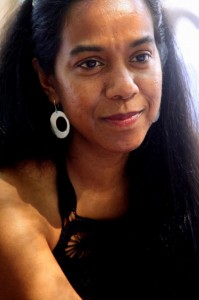 it is also that of the country to which I owe my particular world view; that fertile soil, rich in culture and heritage and custom and religion, which grounds me and gives me the right to say, I am a Sri Lankan American writer. I see myself, then, as an outpost of sorts, a vessel that contains all that I have left behind in Sri Lanka, and, also, as a spokesperson for others of my kind. How, then, would it be possible for me to converse and befriend my fellow predominantly foreign-based writers and not give equal attention to the writers who, based as they are in Sri Lanka, do not have access to the publishing world in quite the same way that we do? How would they get critical attention for their work if those of us who are a little further down along the road not only leave no signposts, but forget that there are others making this same journey?
it is also that of the country to which I owe my particular world view; that fertile soil, rich in culture and heritage and custom and religion, which grounds me and gives me the right to say, I am a Sri Lankan American writer. I see myself, then, as an outpost of sorts, a vessel that contains all that I have left behind in Sri Lanka, and, also, as a spokesperson for others of my kind. How, then, would it be possible for me to converse and befriend my fellow predominantly foreign-based writers and not give equal attention to the writers who, based as they are in Sri Lanka, do not have access to the publishing world in quite the same way that we do? How would they get critical attention for their work if those of us who are a little further down along the road not only leave no signposts, but forget that there are others making this same journey?
As I walked around going from one session to another, I was struck also by the fact that this desire to immerse myself in the literary talents and preoccupations of a host country, even when it is my own, is probably shared by the other writers who come to Sri Lanka, in the same way they do when they go to the Jaipur Literature Festival or to the Perth International Arts Festival or the Man Hong Kong International Literary Festival. For a writer anywhere, there are two things that are manna from heaven: the company of other writers and exposure to new worlds. 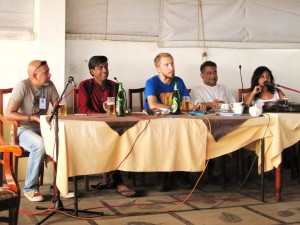 I would hazard a guess that writers like Slovo and Dasgupta and Adebago would be just as interested in listening to and interacting with a multi-ethnic cross section of Sri Lankan writers as well as Sri Lankan culture (a need that the fringe festival addressed whenever possible with panels such as ‘The Literature of Post-War Sri Lanka’ which featured writer and photographer Pradeep Jeganathan, journalist Malinda Seneviratne and former-soldier and writer, David Blacker, as well as the event titled ‘Stories at Sunset’ at the Closenberg Hotel which was organized by local author, Ashok Ferry, alongside the equally commendable offerings of the main festival such as the panels on art, photography and architecture and the drum and dance performances), as they would be in having meaningful conversations with each other. Indeed, such engagement is what gives a festival its particular character and distinguishes it from any other event at which these same writers may have occasion to gather together.
I would hazard a guess that writers like Slovo and Dasgupta and Adebago would be just as interested in listening to and interacting with a multi-ethnic cross section of Sri Lankan writers as well as Sri Lankan culture (a need that the fringe festival addressed whenever possible with panels such as ‘The Literature of Post-War Sri Lanka’ which featured writer and photographer Pradeep Jeganathan, journalist Malinda Seneviratne and former-soldier and writer, David Blacker, as well as the event titled ‘Stories at Sunset’ at the Closenberg Hotel which was organized by local author, Ashok Ferry, alongside the equally commendable offerings of the main festival such as the panels on art, photography and architecture and the drum and dance performances), as they would be in having meaningful conversations with each other. Indeed, such engagement is what gives a festival its particular character and distinguishes it from any other event at which these same writers may have occasion to gather together.
It is always easy to criticize an initiative that is taken by someone else. And it is easy enough to disparage the work of one or the other group of writers within a multi-language system such as ours. 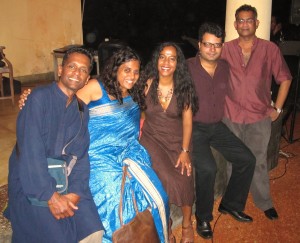 Slings and arrows are easy to unleash, it is the building blocks that take work and separates the slouch from the citizen and neither Sunila Galappatti nor Subha Wijesiriwardena is a slouch, clearly bringing a wealth of experience in theater and writing to their work and giving heart and soul over to managing every last detail of a large festival involving multiple personalities, some of them split! In that regard, I was disappointed by the way in which journalist Rajpal Abeynayake summarily dismissed the entire – albeit recent – canon of writing in English as being garbage. There is garbage.
Slings and arrows are easy to unleash, it is the building blocks that take work and separates the slouch from the citizen and neither Sunila Galappatti nor Subha Wijesiriwardena is a slouch, clearly bringing a wealth of experience in theater and writing to their work and giving heart and soul over to managing every last detail of a large festival involving multiple personalities, some of them split! In that regard, I was disappointed by the way in which journalist Rajpal Abeynayake summarily dismissed the entire – albeit recent – canon of writing in English as being garbage. There is garbage. 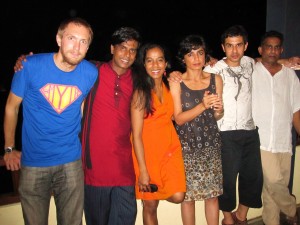 We all know it and we can all manage the delicate art of discussing garbage without throwing it around, in the interest of preserving human dignity. But there is also solidly accomplished writing and, more importantly, there is a serious attempt on the part of those writing in English to both reach their full potential as well as to translate into English those works from the Sinhala and Tamil canon that are translatable. (I admit I came late to this session – again, I was torn between listening to the panel on post-war literature I mentioned above and the one being facilitated by Sunila at a festival venue with Rajpal; both panelists had reached a point of testiness and there was a sort of restive fatigue apparent among the audience as well.)
We all know it and we can all manage the delicate art of discussing garbage without throwing it around, in the interest of preserving human dignity. But there is also solidly accomplished writing and, more importantly, there is a serious attempt on the part of those writing in English to both reach their full potential as well as to translate into English those works from the Sinhala and Tamil canon that are translatable. (I admit I came late to this session – again, I was torn between listening to the panel on post-war literature I mentioned above and the one being facilitated by Sunila at a festival venue with Rajpal; both panelists had reached a point of testiness and there was a sort of restive fatigue apparent among the audience as well.)
The criticism that there is insufficient attention given to the work of the host country, the best of which is, probably, written in Sinhala and Tamil, is valid, but is is one that ought to be leveled with the understanding that any initiative is dynamic and changing; 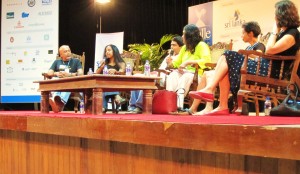 the festival has evolved from the first in 2007 to what it is today and will, I am certain, continue to change. I comment on this aspect of the festival, therefore, in full knowledge that this year it has grown to include genres not part of the festival in previous years both in terms of its panels and conversations but also in terms of the off-site events and the cultural and childrens’ programming, and that such changes auger well for other, even more significant adjustments to be made to the makeup of the festival next year. It is true that, as
the festival has evolved from the first in 2007 to what it is today and will, I am certain, continue to change. I comment on this aspect of the festival, therefore, in full knowledge that this year it has grown to include genres not part of the festival in previous years both in terms of its panels and conversations but also in terms of the off-site events and the cultural and childrens’ programming, and that such changes auger well for other, even more significant adjustments to be made to the makeup of the festival next year. It is true that, as  David Blacker put it in a blog post he wrote last year, this is not a “Sri Lankan literature festival.” However, it is disingenuous to refer to a festival as being “international” if it quite deliberately excludes, for the most part, Sri Lankan writing in translation, particularly when the current trend among all of the publishing giants and anyone worth their salt in the field of international literature is toward translation, an effort to which the organization Words Without Borders has made a mighty contribution as have the various International PEN organizations in the UK, USA and elsewhere. This is the first paragraph of the mission statement for Words Without Borders and it is a far better description of why translation is important than I could manage:
David Blacker put it in a blog post he wrote last year, this is not a “Sri Lankan literature festival.” However, it is disingenuous to refer to a festival as being “international” if it quite deliberately excludes, for the most part, Sri Lankan writing in translation, particularly when the current trend among all of the publishing giants and anyone worth their salt in the field of international literature is toward translation, an effort to which the organization Words Without Borders has made a mighty contribution as have the various International PEN organizations in the UK, USA and elsewhere. This is the first paragraph of the mission statement for Words Without Borders and it is a far better description of why translation is important than I could manage:
Words without Borders translates, publishes, and promotes the finest contemporary international literature. Our publications and programs open doors for readers of English around the world to the multiplicity of viewpoints, richness of experience, and literary perspective on world events offered by writers in other languages. We seek to connect international writers to the general public, to students and educators, and to print and other media and to serve as a primary online location for a global literary conversation.
Literary achievement is never a zero-sum game and the respectful inclusion of each others work ought to be seen as a way of bolstering the foundation of our shared interest in the life of the word, rather than as a way of distracting or otherwise reducing the worth of a single person’s contribution. If it was possible to give Michael Meyler the opportunity to conduct an engaging and illuminating discussion about the well produced trilingual book, Keerthihan’s Kite, is it not possible, also, to present Sri Lankan work in translation using the same audio/visual devices? 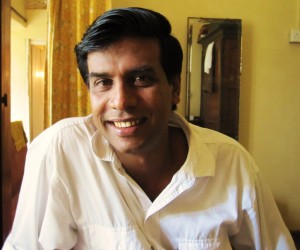 It is entirely conceivable to me that the festival organizers could ask for the help of accomplished bi-lingual writers and translators like Malinda Seneviratne, Dr. Lakshmi de Silva, Thambiaiyah Thevathas and others like them, to handle that particular aspect of the GLF in future years or, at the very least, serve in some sort of advisory capacity to facilitate that conversation. If the festival is, as it has become, the international face of Sri Lanka with regard to its literature, then I do believe that it is obliged to represent the country’s breadth and depth of writing, in all its languages. And that is a responsibility that ought to be embraced as a privilege, not a hardship.
It is entirely conceivable to me that the festival organizers could ask for the help of accomplished bi-lingual writers and translators like Malinda Seneviratne, Dr. Lakshmi de Silva, Thambiaiyah Thevathas and others like them, to handle that particular aspect of the GLF in future years or, at the very least, serve in some sort of advisory capacity to facilitate that conversation. If the festival is, as it has become, the international face of Sri Lanka with regard to its literature, then I do believe that it is obliged to represent the country’s breadth and depth of writing, in all its languages. And that is a responsibility that ought to be embraced as a privilege, not a hardship.
The issue of festival access has been raised often and, during the Q&A with Rajpal, I was aghast to hear a member of the audience (I was told later that this was Antony Beevor but since I never met the man I cannot confirm that), 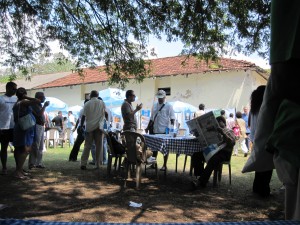 question the government of Sri Lanka for requesting that a festival which is largely private, pay taxes that are due to the country. The issue raised by the individual was that “there is no literary festival in the world that is expected to pay taxes.” Well, the truth is, as always, not quite so simple. Festivals that are free to the public are not taxed. Whenever an event, that involves as much private enterprise
question the government of Sri Lanka for requesting that a festival which is largely private, pay taxes that are due to the country. The issue raised by the individual was that “there is no literary festival in the world that is expected to pay taxes.” Well, the truth is, as always, not quite so simple. Festivals that are free to the public are not taxed. Whenever an event, that involves as much private enterprise 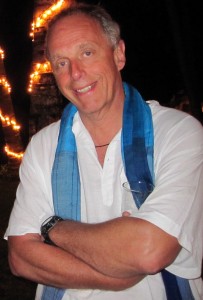 as does this particular festival, excludes – because of its fee-charging design – a large portion of the resident population, it must necessarily be treated differently. One way to avoid this is to emulate our closest neighboring festival, Jaipur, and make it entirely free although I realize that this would involve a significant degree of fund-raising to take place prior to the festival. And since I dislike making a criticism without offering some solution, might I suggest that the festival offer the option of named patrons, as is done with regard to so many other ventures involving the arts (the Aukland Writers & Readers Festival operates along these lines) something I would imagine would be just as enticing if not more so, than purchasing tickets to private events? That would also make it possible to offer a choice of the ever-popular literary dining experiences to such individuals while reserving an equal number of seats to be awarded to festival goers by lottery.
as does this particular festival, excludes – because of its fee-charging design – a large portion of the resident population, it must necessarily be treated differently. One way to avoid this is to emulate our closest neighboring festival, Jaipur, and make it entirely free although I realize that this would involve a significant degree of fund-raising to take place prior to the festival. And since I dislike making a criticism without offering some solution, might I suggest that the festival offer the option of named patrons, as is done with regard to so many other ventures involving the arts (the Aukland Writers & Readers Festival operates along these lines) something I would imagine would be just as enticing if not more so, than purchasing tickets to private events? That would also make it possible to offer a choice of the ever-popular literary dining experiences to such individuals while reserving an equal number of seats to be awarded to festival goers by lottery.
(Which, by the way, is not to say that those who have paid the fees thus far ought to be condemned as being “air heads” (as referenced in Yasmine Gooneratne’s article on the festival), quite the contrary; I found most of the Colombo socialites to be well read and more than able to engage in knowledgeable discussions about literature and writing: Sri Lankans, after all, are a highly educated populace and the possession of wealth does not automatically exclude a person from that national character!)
The lasting impression of the festival for me is one of valiant effort – chiefly by its executors and volunteers – and one of learning to distinguish the writer – eminent or fledgling- who 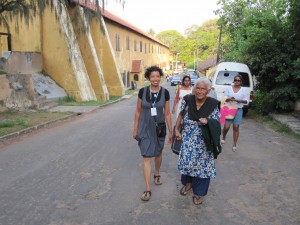 is willing to immerse themselves in place, moment and literary endeavor from the writer who is simply there to soak up the perquisites of a festival hosted in the near paradisaical setting of Galle, which is very tempting, given its history, location, Lighthouse Hotel, Sun House and everything in between. Mercifully, there were more of the former and, refreshingly, all of the writers from the subcontinent belonged fairly and squarely to that group. It was good to discover that
is willing to immerse themselves in place, moment and literary endeavor from the writer who is simply there to soak up the perquisites of a festival hosted in the near paradisaical setting of Galle, which is very tempting, given its history, location, Lighthouse Hotel, Sun House and everything in between. Mercifully, there were more of the former and, refreshingly, all of the writers from the subcontinent belonged fairly and squarely to that group. It was good to discover that 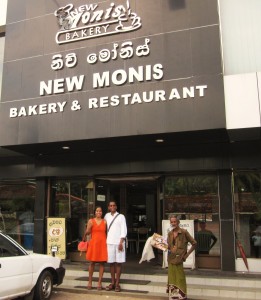 eating kottu at an unsavory roadside stall with Amit Varma, downing pittu and katta sambol with Rana Dasgupta, walking to the kite-flying activity on the Galle Fort with Michelle de Kretser and stopping for tea and laveriya at Monis Bakery on the way to Galle with Shyam Selvadurai blended seamlessly with our conversations about our writerly lives, with signing books and holding microphones on stages which elevate us and our accomplishments, often only artificially and almost always only momentarily, from those of others. When human endeavor permits the human being their humanity, that is the true measure of success.
eating kottu at an unsavory roadside stall with Amit Varma, downing pittu and katta sambol with Rana Dasgupta, walking to the kite-flying activity on the Galle Fort with Michelle de Kretser and stopping for tea and laveriya at Monis Bakery on the way to Galle with Shyam Selvadurai blended seamlessly with our conversations about our writerly lives, with signing books and holding microphones on stages which elevate us and our accomplishments, often only artificially and almost always only momentarily, from those of others. When human endeavor permits the human being their humanity, that is the true measure of success.
Note: The two photographs of me used in the first and fourth paragraphs were taken by Sharni Jayawardena


